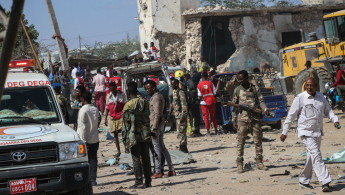US strikes Al-Shabaab militants after deadly Somalia attack
The strikes came one day after Somalia's deadliest attack in two years, when a car bomb killed at least 81 people in a busy area of Mogadishu.
"In coordination with the federal government of Somalia, US Africa Command conducted three airstrikes in two locations targeting al-Shabaab militants in the vicinity of Qunyo Barrow and Caliyoow Barrow, Somalia, respectively, December 29," AFRICOM said in a statement.
It said two strikes had killed two militants and destroyed two vehicles in Qunyo Barrow while a separate strike killed another two in Caliyoow Barrow.
US strikes in Somalia surged after President Donald Trump declared the south of the country an "area of active hostilities”, according to new reports.
The rate of airstrikes has risen sharply this year, and in an April statement AFRICOM said it had killed more than 800 people in 110 airstrikes in Somalia since April 2017.
AFRICOM’s comments came after 81 people, including many university students, were killed in an attack in the Somali capital.
"The overall number of the dead stands at 81 currently. Two more people died from their injuries," Ismail Muktar, a spokesman for Somalia's information ministry, told AFP Monday.
No one has claimed responsibility, though President Mohamed Abdullahi Mohamed blamed Islamist group Al-Shabaab, which has regularly carried out car bombings and other attacks as part of its decade-long bid to topple the internationally-backed government.
Al-Shabaab was forced out of the Somali capital in 2011 but still controls parts of the countryside.
Twitter Post
|
The group often strikes the most prominent hotels and restaurants, and has also staged attacks in neighbouring Kenya.
"Since al-Shabaab's first external attack in 2010, the group has ruthlessly killed hundreds," said US Army Major General William Gayler, AFRICOM's director of operations.
"They have attacked and killed African partners, allies, and fellow Americans."
Saturday's bombing was the deadliest since truck exploded in 2017 near a fuel tanker, creating a fireball that killed over 500 people.
At least 16 of those killed were students from the capital's private Banadir University, who had been travelling on a bus when the car bomb detonated at a busy intersection southwest of the Somali capital.
The director of the private Aamin Ambulance service, Abdukadir Abdirahman Haji, told AFP around 125 people were injured, a number which has overwhelmed health services in the capital.
Read more: The UAE still supports al-Shabaab through Somalia's illicit charcoal trade
Two weeks ago five people were killed when al-Shabaab attacked a popular Mogadishu hotel in an hours-long siege.
The SYL hotel is close to the main entrance to the Villa Somalia government complex, a high-security area that includes the presidential palace, the prime minister's office and ministry buildings.
The hotel, which is popular with government officials, business people and visiting diplomats and delegations, has suffered three previous deadly attacks, all claimed by the al-Shabaab group.
The first, in January 2015, killed five people when a suicide car bomber rammed the hotel gates on the eve of a visit by Turkey's President Recep Tayyip Erdogan.
In February 2016, twin blasts set off close to the hotel and the neighbouring Peace Garden killed 14 people.
Then in August of the same year, a suicide car bomb attack on the hotel killed 15 people and caused extensive damage.
A similar attack in July of this year killed civilians, including the mayor of Somalia's capital Mogadishu who died of wounds sustained in the militant bombing attack on his office.
Mayor Abdirahman Omar Osman died while doctors were treating his wounds at a hospital in Doha, a spokesman for the Somali president's office said.
Six people were killed and Osman was initially wounded in the July 24 attack on a government building claimed by Al-Shabaab jihadists to have been targeting a UN envoy.
UN special envoy James Swan had met the mayor and left just before the blast at the headquarters of the Banadir district.
Follow us on Twitter and Instagram to stay connected





 Follow the Middle East's top stories in English at The New Arab on Google News
Follow the Middle East's top stories in English at The New Arab on Google News
![Israeli forces ordered bombed Gaza's Jabalia, ordering residents to leave [Getty]](/sites/default/files/styles/image_330x185/public/2176418030.jpeg?h=a5f2f23a&itok=_YGZaP1z)

